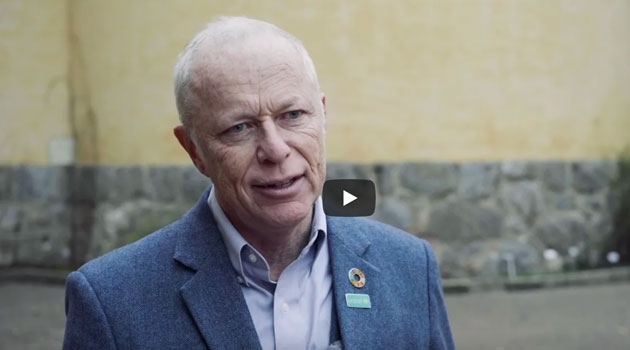Prize for global work to promote child health rights
Stefan Swartling Peterson, Professor of Global Health at Uppsala University and UNICEF health specialist, has been awarded the 2020 Martin Henriksson Holmdahl Prize for the promotion of human rights and freedoms.
The Martin Henriksson Holmdahl Prize, which amounts to SEK 50,000, is Uppsala University’s foremost award for contributions to the promotion of human rights and freedoms. This year’s prize has been awarded to Stefan Swartling Peterson for his commitment to the right of children and young people to healthcare.
During the period 2016–2020, Stefan Swartling Peterson took a leave of absence from his post as professor and teacher to work for the United Nations Children's Fund (UNICEF) in New York as Chief of the Health Section. His research deals with the gap between children’s right to healthcare and the real-world possibilities to provide this care.
The slow dissemination of knowledge
According to Stefan Swartling Peterson, it often takes a long time for medical knowledge to trickle down.
“In the 1960s, Martin Henriksson Holmdahl was already working with oxygen and the use of bag valve masks to resuscitate newborn infants. It is only now, fifty years later, that this is beginning to reach the field. It was actually this slow dissemination of existing knowledge that led me to work for UNICEF for a number of years, in the hope of speeding things up.”
In addition to improving access to healthcare, he has also worked to promote children’s right to health.
“Of course, health is dependent on a number of determinants: clean and nutritious food, clean air, clean water, housing, education, social welfare and also healthcare. These are the most important determinants of health that we need to work with and this makes health a product of the actions of every individual and sector of society.”
An existential crisis for humanity
According to Professor Swartling Peterson, we currently find ourselves in the midst of an existential crisis in which climate catastrophe is impacting on all of the determinants of health. It is this that he wishes to devote himself to now he has returned to Sweden after four years in New York.
“We are after all facing an existential crisis for humanity that is actually a matter of our survival. To adjust for the climate catastrophe to allow for sustainable health, that is what I intend to devote myself to now.”
What is the university’s role in this work?
“It is to provide knowledge, education and collaboration – the three tasks of the university. We must do so in completely new and exciting ways because we only have 10 years before the climate reaches the tipping point to a permanent ‘greenhouse Earth’, on which people will find it hard to survive.”
Annica Hulth
Facts: Stefan Swartling Peterson
- Stefan Swartling Peterson graduated as a medical doctor from Uppsala University in 1990 before taking a Master’s Degree in Public Health at Harvard School of Public Health.
- He conducted work for his PhD in International Health in the Central African Republic and Tanzania before defending his dissertation in Uppsala in 2000. In 2009, he was appointed to a professorship at Karolinska Institutet. In 2012, he was named Uppsala University’s Alumnus of the Year and became professor at Uppsala University.
- In 1993, Professor Swartling Peterson was one of the founder members of the Swedish branch of Médecins Sans Frontières and he has enjoyed many years of close collaboration on various health-related projects with colleagues at Makerere University in Uganda.
- During the period 2016–2020, he took a leave of absence from his post as professor and teacher to work for the United Nations Children's Fund (UNICEF) in New York as Chief of the Health Section.
Extract from the committee’s award citation:
“This award recognises Swartling Peterson’s enormous commitment to the right of children and young people to access healthcare. This is apparent not least in his willingness to leave his research and teaching position in order to pursue these issues in a central international organisation for the health of children, UNICEF. It is of particular value that Stefan Swartling Peterson’s international perspective on child rights is now benefitting a new generation of doctors through his commitment to medical education.”

